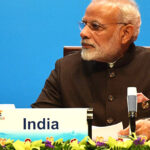
The more things change the more they stay the same. In the 2024 Diplomatic Bluebook, recently released through the Ministry of Foreign Affairs, Japan assertively labeled China a global threat, while still carefully trying to balance both positive and negative terms. The new edition employs much stronger language about its regional rival, characterizing Beijing’s activity in the South China Sea as “unilateral attempts to change the status quo by force or coercion.” The not-so-subtle change in the language in the new edition (as well as the previous 2023 edition) is predicated on the central theme of Beijing’s progressively coercive efforts.

The changes are also representative of the technological advancements that have altered the security dynamic in the region, as Tokyo worries about China’s dramatic increases in military spending, which the U.S. recently warned could exceed more than $700 billion. This was parallel to a concern raised by Chief Cabinet Secretary Yoshimasa Hayashi back in March. The fog in which Beijing operates also comes from a buildup in the East and South China Seas, which has drawn the ire of Defense Minister Minoru Kihara. Informationization has long been a priority of China, which has aimed to open a new area of modern warfare through multiple channels of communication-based infrastructure.
Confronting China in the security realm is a monumental challenge, as Japan is still largely dependent on the United States and security ties to Indo-Pacific partners like India and EU Member States are still in the early stages. Attempts at more assertive bilateral communication, such as through the Japan-China Security Dialogue and its attempt at a communications hotline with Beijing last year, have mostly been fruitless affairs. Thus, the third chapter of the new Bluebook is a formal and public diplomatic explanation of its alliance and defense strategies that are squarely aimed at China, as well as lingering security threats from North Korea and Russia. For keen observers of Japan’s defense policy, this is not at all surprising and has been a part of Japan’s security and defense reorientation for several years.
With China now squarely in the sights of Japan, also evident in the 2023 Bluebook is a strong indicator that Tokyo’s foreign policy environment will be volatile at best, with policy aimed at responding to PLA coercion through a stronger promotion of the Free and Open Indo-Pacific plan that aims to broaden regional cooperation. This cooperation will play out in the realm of maritime security, intending to mitigate any damage caused by China’s “economic coercion,” which was also a key theme of the 2023 G7 Summit in Osaka.
As is typical in this long-running publication, Japan presents itself in the most positive light, focusing on an open diplomacy rich with evidence of its soft power and status projection, with cherry-picked examples from its engagement in Africa through TICAD, Security Council leadership and reform efforts, and nuclear disarmament objectives. What’s missing is the stark contrast between Tokyo and Beijing on the international stage, where China’s lead on the African continent is miles ahead, both in terms of extractive industries, rare earth minerals, infrastructure, and the size of its diplomatic presence. Beijing’s soft power also extends into complex relationships with line ministries and civil society, where the funding of hospitals and other critical development provide evidence to the scale of Japan’s challenge.
But closer to home, the pillars of Japan’s FOIP plan offer clues on how it can go toe to toe with Beijing, balancing the combative rhetoric with real-world results. For example under Pillar 1, “Principles for Peace and Rules for Prosperity,” the Indo-Pacific Economic Framework (IPEF) offers Japan a chance to engage with ASEAN partners at the ministerial-level, particularly in areas where each share vulnerabilities that were exacerbated by COVID-19 and continued Chinese aggression in the all-important Strait of Malacca. Second, in its own backyard and in the tense South China Sea, Japan’s emphasis on strengthening the rule of law through a variety of institutional mechanisms as well as flexing its diplomatic credentials and well-earned reputation in Southeast Asia via technical assistance and training to critical partners like Vietnam, Cambodia, Laos, and Indonesia.
Clearly, the Chinese reaction was predictably negative and it also provoked nationalist sentiments in South Korea over its claims to “Dokdo” or Takeshima, but this is par for the course with a less than surprising reorientation of Japan’s security posture.
As I said, the more things change, the more they stay the same.





